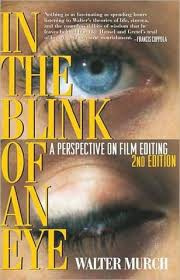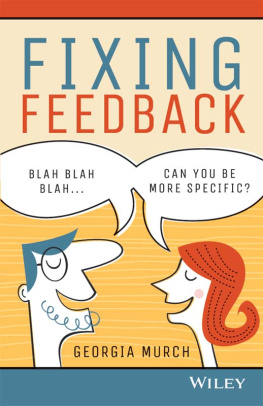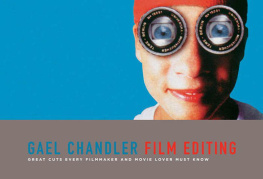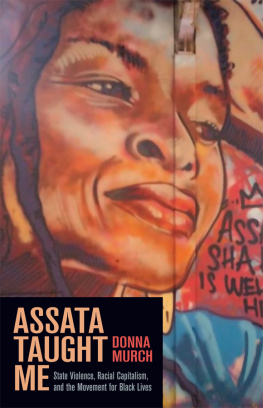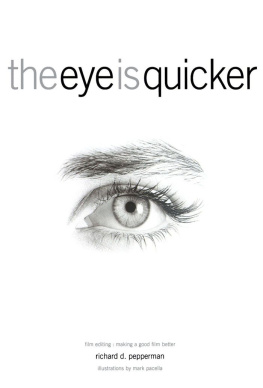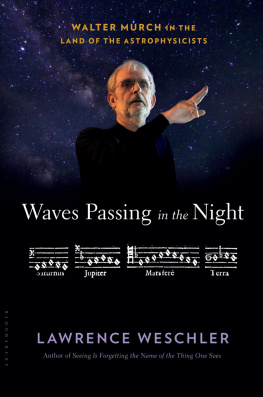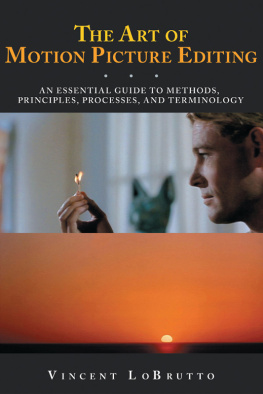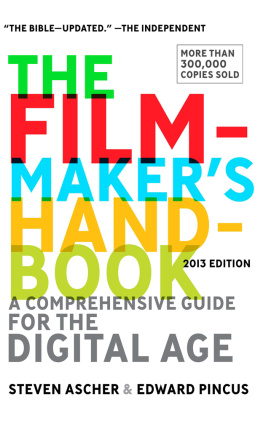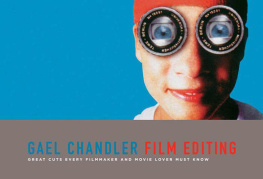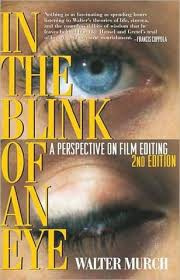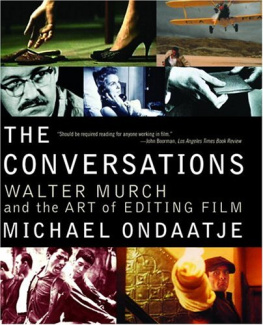Murch - In the blink of an eye: a perspective on film editing
Here you can read online Murch - In the blink of an eye: a perspective on film editing full text of the book (entire story) in english for free. Download pdf and epub, get meaning, cover and reviews about this ebook. City: Los Angeles, year: 2001, publisher: Silman-James Press, genre: Home and family. Description of the work, (preface) as well as reviews are available. Best literature library LitArk.com created for fans of good reading and offers a wide selection of genres:
Romance novel
Science fiction
Adventure
Detective
Science
History
Home and family
Prose
Art
Politics
Computer
Non-fiction
Religion
Business
Children
Humor
Choose a favorite category and find really read worthwhile books. Enjoy immersion in the world of imagination, feel the emotions of the characters or learn something new for yourself, make an fascinating discovery.
- Book:In the blink of an eye: a perspective on film editing
- Author:
- Publisher:Silman-James Press
- Genre:
- Year:2001
- City:Los Angeles
- Rating:5 / 5
- Favourites:Add to favourites
- Your mark:
- 100
- 1
- 2
- 3
- 4
- 5
In the blink of an eye: a perspective on film editing: summary, description and annotation
We offer to read an annotation, description, summary or preface (depends on what the author of the book "In the blink of an eye: a perspective on film editing" wrote himself). If you haven't found the necessary information about the book — write in the comments, we will try to find it.
Murch: author's other books
Who wrote In the blink of an eye: a perspective on film editing? Find out the surname, the name of the author of the book and a list of all author's works by series.
In the blink of an eye: a perspective on film editing — read online for free the complete book (whole text) full work
Below is the text of the book, divided by pages. System saving the place of the last page read, allows you to conveniently read the book "In the blink of an eye: a perspective on film editing" online for free, without having to search again every time where you left off. Put a bookmark, and you can go to the page where you finished reading at any time.
Font size:
Interval:
Bookmark:

IN
THE
BLINK
OF
AN
EYE
All rights reserved. No part of this book may be used or reproduced in any manner whatsoever without written permission from the publisher, except in the case of brief quotations embodied in critical articles and reviews.
First Edition 10 9 8 7 6 5 4
Permission was graciously extended by the respective publishers for the use of material from the following works:
The Magic Lantern by Ingmar Bergman, p. 35. 1988 Viking Press, New York, NY, 10010. Translation by Joan Tate. Originally published as Lanterna Magica in 1987 by Norstedts Forlag, Sweden. Reproduced by permission of Hamish Hamilton Ltd., London.
Language in Four Dimensions by William Stokoe. New York Academy of Sciences, 1979.
Christian Science Monitor, interview with John Huston by staff writer Louise Sweeney, August 11, 1973.
Photos from the film The Unbearable Lightness of Being used with permission of the Saul Zaentz Co. All rights reserved. 1988
Library of Congress Cataloging-in-Publication Data
Murch, Walter, 1943-In the blink of an eye / by Walter Murch2nd ed. p. cm.
1. Motion picturesEditing. I. Title.
TR899.M87 2001 778.5'35-dc21 2001042949
ISBN: 1-879505-62-2
Cover design by Heidi Frieder Cover photographs by Michael D. Brown Printed and bound in the United States of America
Silman-James Press
1181 Angelo Drive Beverly Hills, CA 90210
This is a revised transcription of a lecture on film editing given by Walter Murch in the mixing theater at Spectrum Films, Sydney, Australia, in October 1988. It was one in a series of lectures sponsored by the Australian Film Commission.
Sections of this lecture were also included in a presentation given in February 1990 to the Advanced Editing class taught by Barbara and Richard Marks as part of the UCLA Graduate School of Theater, Film, and Television.
In 1995, the main text of this book was revised and the Afterword was added. In 2001, the Afterword was rewritten to reflect current developments in digital editing.
The final chapter in this book, Gesamtkunstkino, originally appeared in the Arts and Lesiure section of the New York Times , May 2, 1999.
Foreword by Francis Coppola ix
. Preface to the Second Edition xi
Preface xiii Cuts and Shadow Cuts 1 Why Do Cuts Work? 5 Cut Out the Bad Bits 10 Most with the Least 15 The Rule of Six 17 Misdirection 21
Seeing Around the Edge of the Frame 23
Dreaming in Pairs 26
Team Work: Multiple Editors 29
The Decisive Moment 32
Methods and Machines: Marble and Clay 43
Test Screenings: Referred Pain 52
Dont Worry, Its Only a Movie 57
Dragnet 64
A Galaxy of Winking Dots 70
Afterword:
Digital Film Editing:
Past, Present, and Imagined Future 73
The thought of Walter Murch brings a smile to my face. Im not sure exactly why. It must be the combination of his unique personality, the security inspired by his competence, and his gentleness and wisdom. Gerald MacBoingBoing grown up, still playful and enigmatic, but grounded by an immense intelligence.
Perhaps its also because he was the essential collaborator on what are probably the best films I worked on: The Conversation and The Godfather, Part II. I have a very soft spot in my heart for those films, and The Rain People , because only they were the closest to the goal I had set for myself as a young man: to write original stories and screenplays only. This is something Walter always encouraged me to do, and was best achieved working with him. But Walter is a study unto himself: a philosopher and theoretician of film a gifted director in his own right, attested to by his beautiful Return to Oz. Nothing is so fascinating as spending hours listening to Walters theories of life, cinema, and the countless tidbits of wisdom that he leaves behind him like Hansel and Gretels trail of bread: guidance and nourishment.
I smile also because we are so different from one another: Whereas I make instantaneous decisions relying on emotion and intuition only, Walter is also thoughtful and careful and methodical in every step he takes. Whereas I alternate between the ecstatic and despondent like Teslas alternating current, Walter is constant and warm and reassuring. Every bit as ingenious and intuitive as I am, he is also constant.
Walter is a pioneer, as I would like to be, and the kind of person who should be listened to carefully and enjoyed. For all this, I imagine you would think that I love and respect Walter Murch very muchand I certainly do.
Francis Coppola Napa, 1995
1995 was a watershed year in film editingit was the last time the number of films edited mechanically equaled the number of films edited digitally. Every subsequent year, the digital number has increased and the mechanical number has proportionally decreased. In 1995, no digitally edited film had yet won an Oscar for best editing. Since 1996, every winner has been edited digitallywith the notable exception of Saving Private Ryan in 1998.
1995 was also the year that In the Blink of an Eye was first published in the United States. That edition included a section on digital editing as things stood at the time. It was clear to me then that the complete digitization of the moving image was inevitable, but the time frame for that transformation was not obvious and I looked at the situation with mixed feelings. At that time I also lacked digital editing experience. (I had edited some short films on the Avid, but not an entire feature film.)
That changed the following year: I started editing The English Patient mechanically, but for reasons explained in this new edition of Blink , we changed over to digital during production. And every film that I have worked on since, including the restorations of Touch of Evil and Apocalypse Now , have been edited digitally, using the Avid Film Composer system.
It is a rule of thumb that two and a half years represent a generation in the evolution of computers. More than two of those electronic generations have passed since 1995, so I felt it was time to re-evaluate the cinematic digital landscape in general and digital editing in particular. Consequently, for this new edition of In the Blink of an Eye, I have completely rewritten and considerably expanded the digital editing section, including my personal experiences making the mechanical-to-digital transition and some premonitionsboth technical and artisticas we begin cinemas second century.
Walter Murch
Toronto, June 2001
Igor Stravinsky loved expressing himself and wrote a good deal on interpretation. As he bore a volcano within him, he urged restraint. Those without even the vestige of a volcano within them nodded in agreement, raised their baton, and observed restraint, while Stravinsky himself conducted his own Apollon Musagete as if it were Tchaikovsky. We who had read him listened and were astonished.
The Magic Lantern by Ingmar Bergman
Most of us are searchingconsciously or uncons ciouslyfor a degree of internal balance and harmony between ourselves and the outside world, and if we happen to become awarelike Stravinsky of a volcano within us, we will compensate by urging restraint. By the same token, someone who bore a glacier within him might urge passionate abandon. The danger is, as Bergman points out, that a glacial personality in need of passionate abandon may read Stravinsky and apply restraint instead.
Many of the thoughts that follow, although presented to the public in a lecture, are therefore more truly cautionary notes to myself, working methods I have developed for coping with my own particular volcanoes and glaciers. As such, they are insights into one persons search for balance, and are perhaps interesting to others more for the glimpses of the search itself than for the specific methods that search has produced.
Next pageFont size:
Interval:
Bookmark:
Similar books «In the blink of an eye: a perspective on film editing»
Look at similar books to In the blink of an eye: a perspective on film editing. We have selected literature similar in name and meaning in the hope of providing readers with more options to find new, interesting, not yet read works.
Discussion, reviews of the book In the blink of an eye: a perspective on film editing and just readers' own opinions. Leave your comments, write what you think about the work, its meaning or the main characters. Specify what exactly you liked and what you didn't like, and why you think so.

